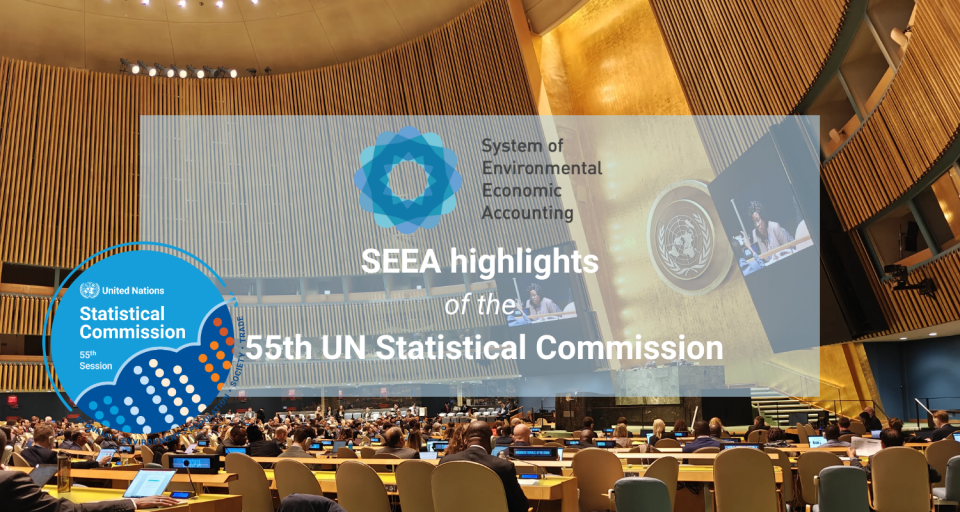SEEA Highlights of the 55th UN Statistical Commission

From 27 February to 2 March, the United Nations Committee of Experts on Environmental-Economic Accounting (UNCEEA) participated in the 55th Session of the UN Statistical Commission (UNSC) in New York. The UNSC provides an opportunity for the UNCEEA to present its achievements and upcoming work programme to chief statisticians from around the world.
One of the primary topics of discussion was the update of the SEEA Central Framework. The UNSC endorsed the proposed update of the SEEA Central Framework, citing that the framework should remain responsive to emerging demands for integrated information for policies such as climate change, biodiversity, etc., and that the framework should maintain coherence with the updated System of National Accounts and other recently revised standards.
A SEEA side event held on 27 February explored ways in which the update could help inform emerging policy demands, for instance those surrounding climate change adaptation and mitigation, disaster risk reduction and measuring the circular economy. Participants also discussed the importance of improving communication of SEEA data. For instance, Mariana Kotzeva, Director General of Eurostat, stressed that the job of SEEA compilers does not end with the release of tables—instead, the results must be translated into the language of users, and national statistical offices should provide policy-relevant indicators to specific user communities as well.
 |
|
The panel included (L-R) Shailja Sharma, Director of the UN Statistical Institute for Asia and the Pacific, Jim Tebrake Deputy Director of the IMF Statistics Department, André Loranger, Assistant Chief Statistician of Statistics Canada (Chair), Mariana Kotzeva, Director General at Eurostat, and David Gruen, Chief Statistician at the Australia Bureau of Statistics. |
The UNCEEA is currently creating a list of issues to be addressed and a roadmap for the update. The list of issues will go through a global consultation process later this year to provide an opportunity for all stakeholders to provide input and feedback. The UNCEEA will submit the final list of issues and roadmap to the Commission next year.
The Commission also showed strong appreciation for the UNCEEA’s accomplishments and support for its work Programme. For instance, delegates welcomed the use of the SEEA Ecosystem Accounting for the monitoring framework of the Kunming-Montreal Global Biodiversity Framework (GBF) and stressed the importance of national statistical offices engaging with their biodiversity focal points. In particular, the SEEA will provide the methodological basis for the compilation of headline indicators such as A2: Extent of natural ecosystems and B1: Services provided by ecosystems.
The Commission also recognized the Committee’s progress in terms of data collection and global databases. In 2023, UNSD and OECD joined Eurostat in collecting air emission and physical energy flow accounts in support of creating global databases. UNSD and OECD will begin their 2024 round of data collection for air emission and energy in early summer 2024, and the Commission has encouraged countries to submit their accounts via the global questionnaire.
In addition, the Commission encouraged the Committee to continue its involvement in the third phase of the Data Gaps Initiative (DGI-3) to support closing the data gaps related to climate change. The DGI-3 has 14 recommendations for closing the data gaps of G20 countries, half of which focus on climate change, and the SEEA is used as the methodological basis for many of the climate change indicators.
The UNSC also recognized the Committee’s progress in advancing SEEA implementation. According to the 2023 Global Assessment, 90 countries currently implement the SEEA. It was recognized that partnerships, regional collaboration, communities of practice and the SEEA focal points network are key to supporting implementation. Over the next year, the UNCEEA will look to strengthen these mechanisms, particularly the SEEA focal points network.
In addition, the Commission endorsed a number of new SEEA related classifications and frameworks. In particular, the Commission endorsed multiple SEEA-related classifications as international statistical classifications, including the IUCN Global Ecosystem Typology and the Classification of Environmental Purposes. Importantly, the IUCN Global Ecosystem Typology will serve as a classification of ecosystem types for the monitoring framework of the GBF. In addition, the Classification of Environmental Purposes will be integrated into the updated SEEA Central Framework. Finally, the Commission adopted the Statistical Framework for Measuring the Sustainability of Tourism (SF-MST). The SEEA has been integrated into the SF-MST for measuring the environmental dimension of the sustainability of tourism, and the UNCEEA has collaborated closely with the World Tourism Organization in the development of the SF-MST. A side event for the SF-MST was held back-to-back with the SEEA side event on new challenges for national statistical offices for environment and climate change statistics.
Resources:
- Report of the Committee to the UNSC: https://digitallibrary.un.org/record/4000151?ln=en.
- Draft decisions of the Commission (currently available in English only but will soon be available in all six official languages): 2024-37-FinalReport-EE.pdf (un.org),
SEEA-relevant side events:
